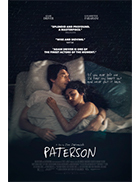Paterson
|  Deceptively simple and emotionally elegant, Jim Jarmusch’s Paterson is a beautiful portrait of the many wells of creativity that spring up all around us. The protagonist is the eponymous Paterson (Adam Driver), a bus driver in Paterson, New Jersey, who spends most of his free time jotting down verse in a small notebook he carries with him. Paterson is quiet, introspective, and uncommonly decent; when so many independent films focus on troubled, dysfunctional narcissists (Jarmusch has contributed a few, including Bill Murray’s washed-up lothario in 2005’s Broken Flowers), Paterson shows us what simple kindness and affability look like. Driver was an interesting casting choice in this regard, as he is known primarily for playing volatile characters, but here he demonstrates a profound sense of depth and feeling in the smallest of actions and looks. The story unfolds over a one-week period, each day opening with an overhead shot of Paterson waking up next to his live-in girlfriend, Laura (Golshifteh Farahani), with the day of the week scrawled on the screen in Paterson’s soon to be familiar handwriting. A creature of quiet habit, Paterson wakes up at almost the exact same time every day without an alarm, puts on his wristwatch, kisses Laura, and then picks up the clothes he has folded neatly on a chair the night before so as not to wake her getting dressed. He eats breakfast and then heads out to the bus depot, where he spends his few remaining minutes before work jotting down lines of poetry based on everyday objects that inspire him (the first poem he writes begins with his acute observations of a book of matches in his kitchen). As he writes the poetry, we see the lines on the screen and we hear Paterson reading them as he writes, thus letting us into his most important interior space. He is a man of few spoken words, but his mind is awash in language and expression, which he pours out on the page. Over the seven days, we get to know various characters in Paterson’s life. Laura is sweet and gracious—a little bit quirky with her love of black-and-white designs (their small, cozy house is decorated largely in monochromatic patterns and shapes, as are all of her clothes) and her sudden inspiration to become a country music star via a guitar and DVD instructional videos she orders online. She packs his lunch each night, and when she asks him the next evening if his sandwich was okay, you get the sense that she isn’t just asking out of habit, but really wants to know. At work, Paterson talks to his supervisor, Donny (Rizwan Manji) each morning, who is the kind of guy who answers “How’s it going?” with an honest litany of his various burdens (which include a rash on his back, his cat developing diabetes, and his daughter trying to learn to play the violin). Each evening, Paterson takes Laura’s bulldog Marvin for a walk down to the local tavern, where he drinks a beer and talks with the bartender, a husky chess player named Doc (Barry Shabaka Henley) who refuses to install a television. He observes bits of human interaction around him, particularly the ongoing breakup between Marie (Chasten Harmon), who is imminently practical, and Everett (William Jackson Harper), who is romantic to the point of delusion. There are also touching one-off moments involving people Paterson meets, including a young girl (Sterling Jerins) who reads him a poem she wrote and a Japanese tourist (Masatoshi Nagase) who shares Paterson’s love of the great modernist poet William Carlos Williams, whose masterpiece is a five-volume book about—you guessed it—Paterson, New Jersey. Jarmusch’s screenplay is laced with recurring events and intriguing ideas, none of which he builds into any kind of conventional dramatic structure. There is a “big” event near the end that is heavily foreshadowed in the film’s earlier passages, and in some ways it is the film’s weakest device because it seems almost inevitable in a way that is less fateful than it is deflating. There are little bits of idiosyncratic humor (Donny’s honest recounting of his various travails being the best bit) and moments of intriguing human observation, particularly the random conversations that Paterson overhears while driving the bus. Like Jarmusch, Paterson is primarily an observer, and everything he takes in during the day finds its way into his poetry (which is actually the creation of American poet Ron Padgett). Such an approach is typical of Jarmusch’s style, and Paterson is one of his most profound embodiments of how the little, daily joys and struggles of life are exactly what make it worth not just living, but embracing. Copyright © 2017 James Kendrick Thoughts? E-mail James Kendrick All images copyright © Amazon Studios |
Overall Rating: 


 (3.5)
(3.5)


